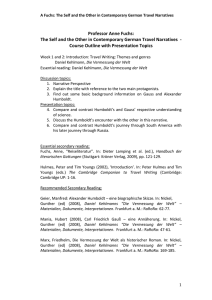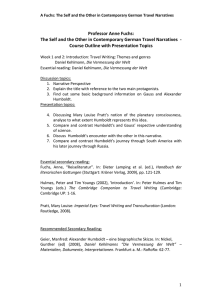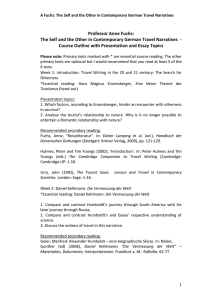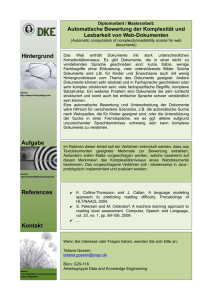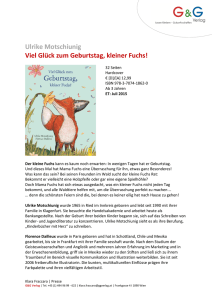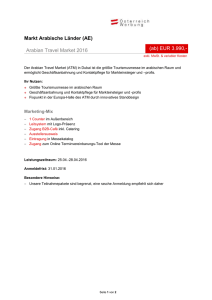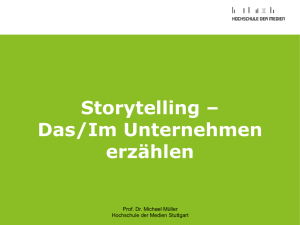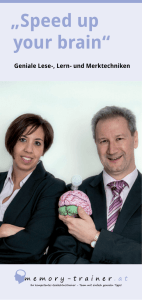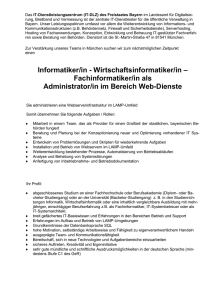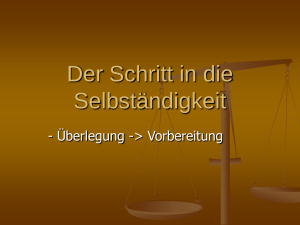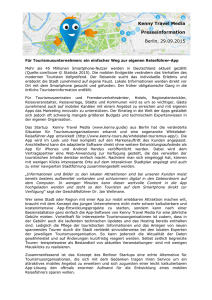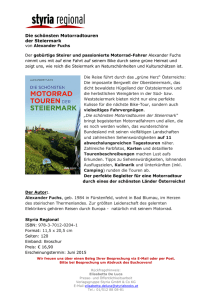A Fuchs: The Self and the Other in Contemporary German Travel
Werbung
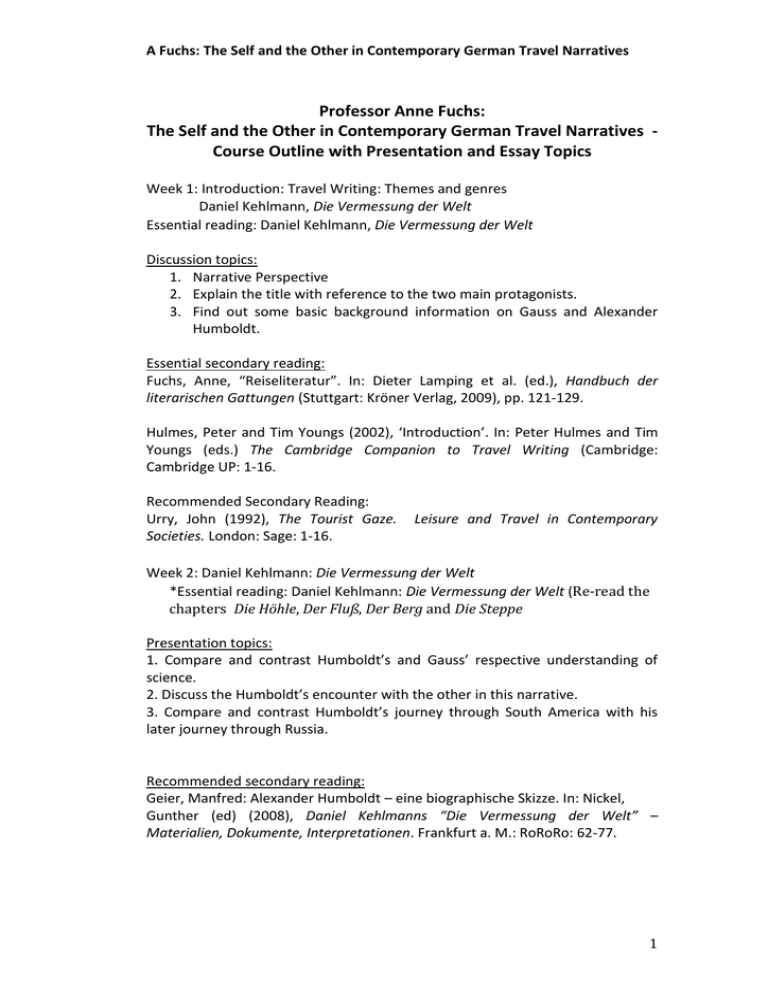
A Fuchs: The Self and the Other in Contemporary German Travel Narratives Professor Anne Fuchs: The Self and the Other in Contemporary German Travel Narratives Course Outline with Presentation and Essay Topics Week 1: Introduction: Travel Writing: Themes and genres Daniel Kehlmann, Die Vermessung der Welt Essential reading: Daniel Kehlmann, Die Vermessung der Welt Discussion topics: 1. Narrative Perspective 2. Explain the title with reference to the two main protagonists. 3. Find out some basic background information on Gauss and Alexander Humboldt. Essential secondary reading: Fuchs, Anne, “Reiseliteratur”. In: Dieter Lamping et al. (ed.), Handbuch der literarischen Gattungen (Stuttgart: Kröner Verlag, 2009), pp. 121-129. Hulmes, Peter and Tim Youngs (2002), ‘Introduction’. In: Peter Hulmes and Tim Youngs (eds.) The Cambridge Companion to Travel Writing (Cambridge: Cambridge UP: 1-16. Recommended Secondary Reading: Urry, John (1992), The Tourist Gaze. Societies. London: Sage: 1-16. Leisure and Travel in Contemporary Week 2: Daniel Kehlmann: Die Vermessung der Welt *Essential reading: Daniel Kehlmann: Die Vermessung der Welt (Re-read the chapters Die Höhle, Der Fluß, Der Berg and Die Steppe Presentation topics: 1. Compare and contrast Humboldt’s and Gauss’ respective understanding of science. 2. Discuss the Humboldt’s encounter with the other in this narrative. 3. Compare and contrast Humboldt’s journey through South America with his later journey through Russia. Recommended secondary reading: Geier, Manfred: Alexander Humboldt – eine biographische Skizze. In: Nickel, Gunther (ed) (2008), Daniel Kehlmanns “Die Vermessung der Welt” – Materialien, Dokumente, Interpretationen. Frankfurt a. M.: RoRoRo: 62-77. 1 A Fuchs: The Self and the Other in Contemporary German Travel Narratives Mania, Hubert (2008), Carl Friedrich Gauß – eine Annäherung. In: Nickel, Gunther (ed) (2008), Daniel Kehlmanns “Die Vermessung der Welt” – Materialien, Dokumente, Interpretationen. Frankfurt a. M.: RoRoRo: 47-61. Marx, Friedhelm, Die Vermessung der Welt als historischer Roman. In: Nickel, Gunther (ed) (2008), Daniel Kehlmanns “Die Vermessung der Welt” – Materialien, Dokumente, Interpretationen. Frankfurt a. M.: RoRoRo: 169-185. Preusser, Heinz-Peter (2008), Zur Typologie der Zivilisationskritik. Was aus Daniel Kehlmanns Roman Die Vermessung der Welt einen Besteller werden ließ. In: Text + Kritik 177: 73-85. Schaumann, Caroline (2009), Who Measures the World? Alexander von Humboldt's Chimborazo Climb in the Literary Imagination. The German Quarterly 82/4: 447-468. Week 3 and 4: Ilja Trojanow EisTau: travel and the environment Essential reading: Ilja Trojanow, EisTau: Presentation topics: 1. Discuss the motif of glacial ice in this narrative. 2. Discuss the environmental discourse in this travel novel. Recommended reading: Goodbody, Axel (2007), Nature, Technology and Cultural Change in 20th century German Literature. The Challenge of Eco-Criticism. Basingstoke: Palgrave/ Macmillan. Goodbody, Axel (ed.) (2002), The Culture of German Environmentalism. Anxieties, Visions, Realities. New York: Berghahn, 2002. Week 5: W. G. Sebald Die Ringe des Saturn: archaeological travel through Suffolk *Essential Reading: W. G. Sebald: Die Ringe des Saturn Presentation topics: 1. Discuss the function of the extensive description of Rembrandt’s Anatomy Lesson for the narrative as a whole. 2. Discuss the descriptions of the local landscape and its interconnectedness with world history. Essential secondary reading: Fuchs, Anne (2007), ‘Ein Hauptkapitel der Geschichte der Unterwerfung’: Representations of Nature in W. G. Sebald’s Die Ringe des Saturn’, in: Anne Fuchs 2 A Fuchs: The Self and the Other in Contemporary German Travel Narratives and J.J. Long (eds), W. G. Sebald and the Writing of History. Würzburg: Königshausen & Neumann: 121-138. Long, J. J. (2007), W. G. Sebald’s Miniature Histories. In: Anne Fuchs and J. J. Long (eds), W. g. Sebald and the writing of History. Würzburg: Königshausen & Neumann: 111-121. Long, J. J., “W.G. Sebald the Anti-Tourist,” in Marcus Zisselsberger (ed.), The Undiscover’d Country: W.G. Sebald and the Poetics of Travel (Rochester, NY: Camden House, 2010), 63-91. WEEK 6: reading week Week 7 and 8: W. G. Sebald Die Ringe des Saturn: archaeological travel through Suffolk *Essential Reading: W. G. Sebald: Die Ringe des Saturn Presentation topics 3. Paying special attention to the narratives about Joseph Conrad, Roger Casement and Edward Fitzgerald, discuss the function of biography in this narrative . 4. Paying particular attention to the narrator’s engagement with Chinese history and the motif of silk, discuss the critique of colonialism in this narrative Essential secondary reading: Cosgrove, Mary (2007), Sebald for our Time: The Politics of Melancholy and the Critique of Capitalism. In: Anne Fuchs and J. J. Long (eds), W. g. Sebald and the writing of History. Würzburg: Königshausen & Neumann: 91-110. Hoorn, Tanja van, “Der ‘Engel der Geschichte’ erzählt W.G. Sebalds Die Ringe des Saturn in Stefan Börnchen and Georg Mein (eds.), Weltliche Wallfahrten: Auf der Spur des Realen (Paderborn: Fink, 2010), 221-34. Weeks 9 and 10: Wolfgang Büscher, Berlin-Moskau: Eine Reise zu Fuß *Essential reading: Wolfgang Büscher, Berlin-Moskau: Eine Reise zu Fuß Presentation topics: 1. Discuss the motivation for and function of the Fußreise in this narrative. 2. Discuss the encounter with otherness in this narrative. Recommended secondary reading: Kaschuba, Wolfgang, “Die Fußreise: Von der Arbeitswanderung zur bürgerlichen Bildungsbewegung”. In: Hermann Bausinger, Klaus Beyrer and Gottfried Korff 3 A Fuchs: The Self and the Other in Contemporary German Travel Narratives (eds.), Reisekultur: Von der Pilgerfahrt zum modernen Tourismus (Munich: Beck, 1991), 165-73. Amann, Wilhelm (2010), ‘Solvitur ambulando: Pilgerräume bei Werner Herzog, “Vom Gehen im Eis” und Wolfgang Büscher “Berlin - Moskau”’. In: Stefan Börnchen and Georg Mein (eds.), Weltliche Wallfahrten: Auf der Spur des Realen Paderborn: Fink: 259-70. Week 10: course summary: the notion of otherness in contemporary Travel writing. 4
